Whipping up a tasty meal from humble ingredients feels like magic, doesn’t it? But mastering that perfect “al dente” pasta is a different ballgame. Just when we think we’ve done it perfectly, we end up with overcooked or undercooked pasta.
But hey, don’t sweat it! All of us have had our pasta blunders. At Least once in our lifetime, we might have searched for how to fix overcooked or undercooked pasta! But actually, with the right tips and a bit of patience, we can send the pasta goodbyes away.
So now, are you ready to level up your pasta skills? By the end of this, you will learn how to fix overcooked or undercooked pasta easily, and no more back look needed later. What to wait for. Let’s start!
Common Mistakes to Avoid in Making Pasta
Isn’t cooking an exhilarating adventure? The triumphs and the mistakes all add flavor to our journey. Let’s zoom in on one particular aspect today – pasta. Our beloved, sometimes tricky, always satisfying pasta!
Before going through how to fix overcooked or undercooked pasta, let’s now look at the common mistakes to avoid in making pasta.
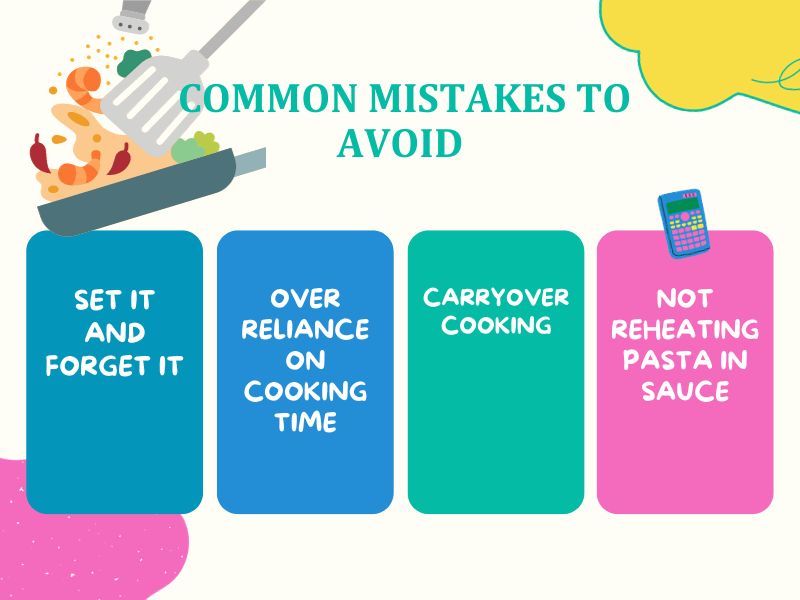
Fig 1 – Common mistakes to avoid in making pasta
1. Set it and Forget it.
Mistake number one, my dear friends, is the infamous ‘Set it and Forget it’ approach. We pop the pasta into boiling water and wander off, dreaming about the deliciousness to come. However, pasta needs attention and love. I’m not a fan of being ignored.
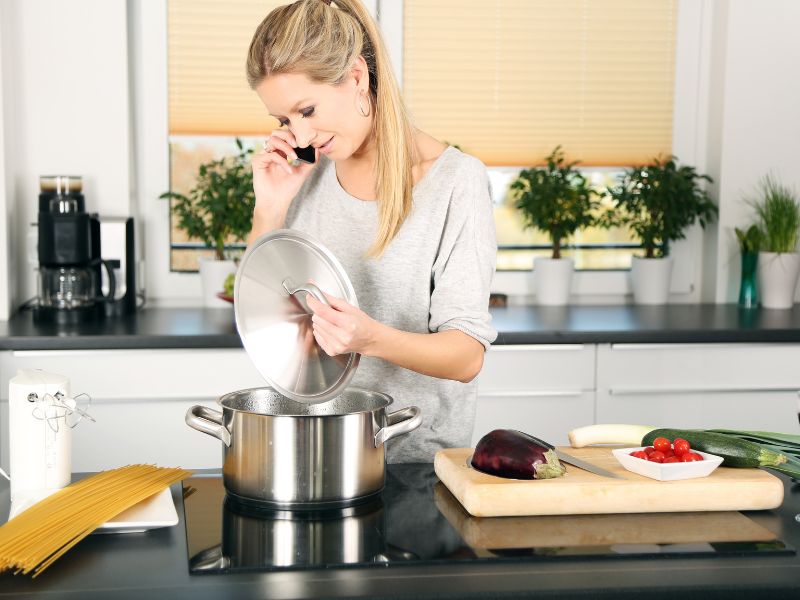
Fig 2 – Set it and forget it mistake
Regular checks and stirrings are a must to prevent the dreaded sticky, clumpy mess. Also, to avoid possible mistakes, you must learn how to cook pasta properly and efficiently. That’s also where half of the game is finished, and you might end up with fewer mistakes.
2. Over-Reliance on Cooking Time
The next common slip-up is over-reliance on the cooking time mentioned on the package. Sure, it’s a useful guide, but it doesn’t account for variations in stove heat, altitude, or even the age of your pasta.
Your senses are your best tool here. Check for doneness by tasting a piece or two, ensuring it has just the right amount of bite.
3. Carryover Cooking
You know what’s tricky? Carryover cooking. It’s that sneaky thing that happens when you drain your pasta. Even off the heat, the pasta continues to cook. Tricky, right?
This could lead to overcooked pasta if you’re not careful. The trick is to account for this carryover cooking when determining when to drain your pasta.
Clever, isn’t it? This way, your pasta will be perfectly cooked every single time. No more mushy pasta nightmares, folks! A simple understanding of carryover cooking can really transform your pasta dishes.
4. Not Reheating Pasta in Sauce
Skipping the step of reheating pasta in sauce is another no-no. Pasta loves to take a swim in the sauce. It absorbs flavor, gets a delightful glossy coat, and maintains a great texture.
All right, my aspiring pasta perfectionists! Remember, these aren’t just mistakes, they’re opportunities for us to grow and improve. So, don’t be disheartened if you’ve made these errors before. Recognizing them is the first step towards pasta mastery!
Understanding Overcooked Pasta
In the part of understanding how to fix overcooked or undercooked pasta. Now, let’s take a moment to understand something we’ve all encountered and regretted – overcooked pasta.
Identifying the Overcooked Villain
First things first, how do we spot an overcooked pasta? It’s quite simple, actually. Overcooked pasta is excessively soft. It collapses rather than holding its shape, and you may even notice a starchy, glue-like substance coating it.
The Culprit Behind Overcooking
Now, why does pasta end up overcooked? According to the article on livestrong.com, the primary reason why pasta ends up overcooked is usually an extended cooking time. The article also mentions that cooking pasta for too long strips nutrients away from the noodles.
When food, including pasta, is cooked for too long, the bonds between the molecules are damaged, which causes nutrient loss. Maybe you stepped away from the stove for a bit too long, or perhaps you strictly followed the timings on the pasta box, not realizing they’re often overestimated.
There you have it. A deep understanding of overcooked pasta is the first step in avoiding it and fixing it. After all, every great pasta chef knows their enemy, right?
Now, with this newfound knowledge, you’re well-equipped to conquer the pasta world. Ready for the challenge? We thought so!
How to Fix Overcooked Pasta
Here are some techniques and things you should try when you are stuck with overcooked pasta.
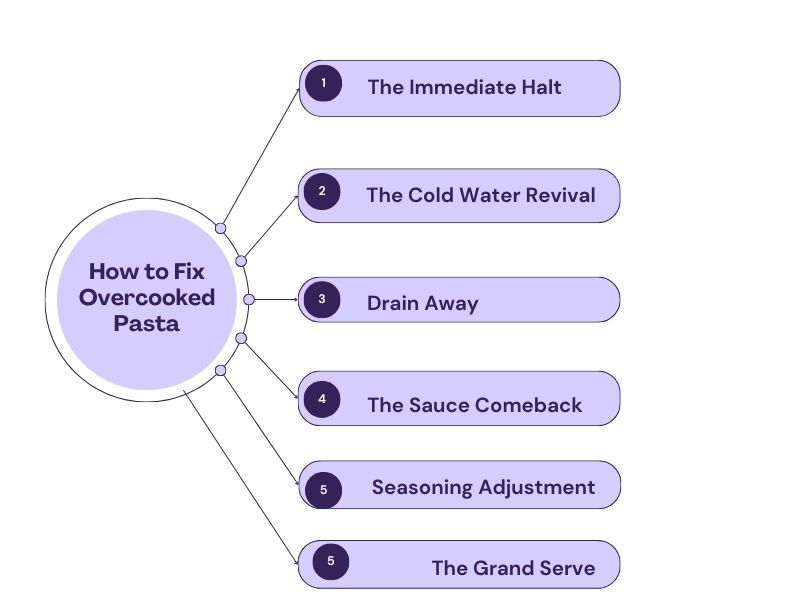
Fig 3 – How to fix overcooked pasta
Step 1: The Immediate Halt
The moment you notice that your pasta is turning into a mushy mess, it’s time to leap into action. No second thoughts; switch off that heat. We’re on a rescue mission now, folks!
Step 2: The Cold Water Revival
Your next move is to quickly drain and give that pasta a refreshing rinse under cold running water. This abrupt change in temperature stops the cooking process in its tracks. Imagine it as a wake-up call that your pasta truly needs!
Step 3: Drain Away
Once you’ve rinsed, ensure you’ve drained out all the excess water. An extra step for our super attentive cooks could be to pat the pasta dry with a clean kitchen towel. Remember, we’re reviving it, not drenching it. So, drain thoroughly!
Step 4: The Sauce Comeback
And here’s the finale. Reintroduce your pasta to a simmering pan of your favorite sauce. The gentle reheating helps the pasta absorb the flavors of the sauce, compensating for any lost taste. The key is to keep the heat low.
We’re aiming for a gentle reunion of flavors, not another boiling bonanza!
Step 5: Seasoning Adjustment
The last leg of our rescue mission is to adjust the seasoning. Overcooked pasta may lose some of its flavor, so this step helps to restore that balance. A pinch of salt, a dash of pepper, maybe some fresh herbs. Play around, trust your taste buds, and make it right!
Step 6: The Grand Serve
Serve the pasta as soon as it’s ready. This is your moment of triumph. You’ve fixed the overcooked pasta and breathed new life into it, and now it’s time to savor your achievement.
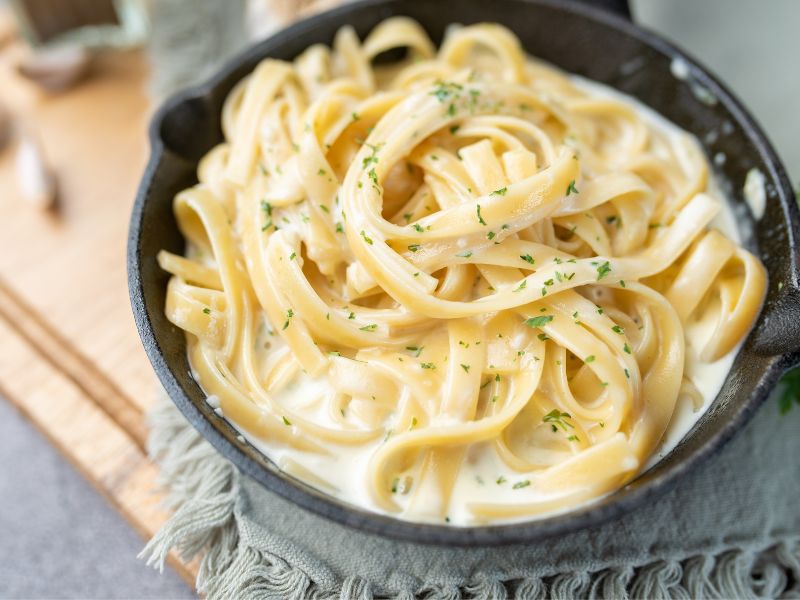
Fig 4 – Perfectly cooked Pasta
Understanding Undercooked Pasta
Ready for another round in the pasta ring? Great! We’ve explored overcooked pasta. Now, let’s ascend the challenging peak of its counterpart – undercooked pasta.
Spotting the Undercooked Offender
Here’s the tell-tale sign of undercooked pasta: it’s too hard. The center is still raw, unyielding to the tooth, and gives a chalky taste.
In pasta language, we appreciate ‘al dente,’ which means ‘to the tooth,’ but undercooked pasta is taking that phrase a tad too literally!
The Why: Reasons for Undercooked Pasta
Several factors can result in undercooked pasta. An insufficient boiling time is the main culprit. Maybe we’re all too excited for that perfect pasta dinner and pull it off the stove too soon.
Alternatively, the cooking water could be at a simmer rather than a full boil, or perhaps the pot was overcrowded, causing uneven cooking.
The Downside: Why We Need to Fix It
Now, why should you care? Because undercooked pasta is not just a culinary disappointment, it’s harder to digest. We want our pasta meals to be satisfying and comfortable, not leaving us with a belly full of regrets.
The Silver Lining: It’s a Fixable Problem
The good news? Undercooked pasta is usually easier to fix than overcooked because all it needs is more time to cook. The game isn’t over yet!
So, pasta pals, understanding undercooked pasta isn’t just about knowing what went wrong. It’s about learning from the experience, understanding why it happened, and devising a plan to set things right.
Now, isn’t that what true pasta mastery is all about? You bet! How long is pasta good for in the fridge? Well, we may not have covered that in this article, but we did cover it in our site. Check that out!
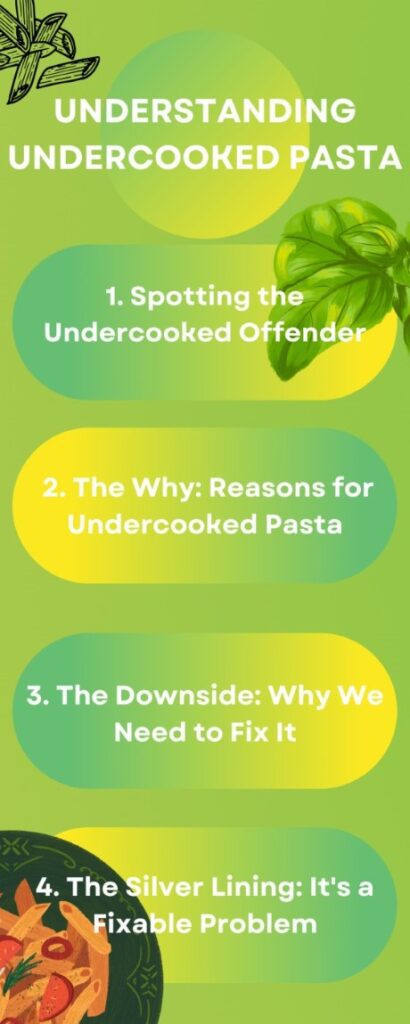
Fig 5 – Reasons of Undercooked Pasta
How to Fix Undercooked Pasta
Turning our attention to the next pasta challenge – undercooked pasta. Let’s see how you can fix it and have a happy meal.
Step 1: The Boiling Reprise
The first and most straightforward solution to undercooked pasta is to return it to the pot and let it finish its cooking journey. Remember, this time, keep a keen eye on it to avoid crossing into overcooked territory.
The most important part is to add some water if required. Be careful again you will end up overcooked if you add so much.
Step 2: Sauce To The Rescue
If you’ve already mixed it with the sauce, don’t fear! You can still salvage the situation. Just simmer the saucy pasta over low heat, allowing the pasta to soak up the sauce and cook further. A little extra time in the pot can work wonders!
Step 3: Steam The Stubbornness Away
Still too firm for your liking? It’s time to bring out the big guns. Transfer your pasta and sauce mixture into a baking dish, cover it with aluminum foil, and pop it into a preheated oven. The steam trapped within will help cook the pasta evenly.
Step 4: The Final Check
The last and most crucial step is the taste test. Always taste your pasta to ensure it has reached your preferred level of ‘doneness’. It’s the ultimate quality control!
And there you have it! With these tips up your sleeve, you’re ready to turn undercooked pasta around.
So the next time you’re faced with a stubbornly firm pasta, you’ll know just what to do. We’re all about turning kitchen predicaments into delicious victories, aren’t we? Let’s keep cooking and learning, one dish at a time!
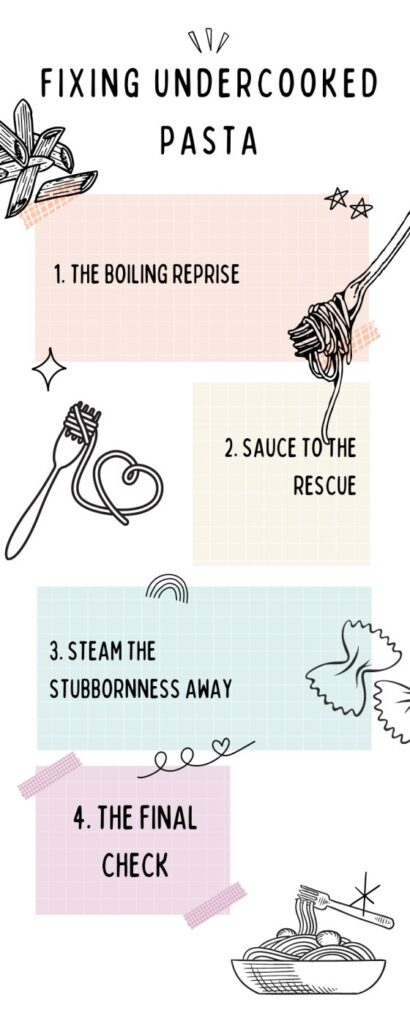
Fig 6 – How to fix undercooked pasta
How to Prevent Overcooked or Undercooked Pasta
Stepping up to tackle pasta like a pro? That’s the spirit! We’ve walked through the woes of overcooked and undercooked pasta and how to fix them. But as they say, prevention is better than cure.
So, let’s arm you with some handy tips to avoid these pasta blunders right from the get-go.
Tip 1: Keep An Eye On The Clock
Timing is everything when cooking pasta. Set a timer as per the package instructions but consider it a guideline rather than gospel. Start checking a few minutes before the recommended time to ensure you achieve that perfect ‘al dente’ stage.
Tip 2: The Power of Boiling Water
Always cook your pasta in a large pot of vigorously boiling water. This ensures even, rapid cooking, and it prevents the pasta from sticking together. A good rule of thumb is to use 4 to 6 quarts of water for every pound of pasta.
Tip 3: Salt Like The Sea
Remember to generously salt your pasta water. This is your golden opportunity to season the pasta itself, which can make a huge difference in the final dish.
How long does pasta sauce last in the fridge? Quite a while, but your pasta will last even longer if you get the seasoning right from the start.
Tip 4: The Stir Factor
Don’t forget to stir the pasta during the first couple of minutes of cooking. This is the crucial time when pasta is most likely to stick together.
Tip 5: The Final Taste Test
Always taste your pasta before draining. It should be ‘al dente’ – cooked, but still firm to the bite. When you think it’s almost ready, just take a bite. That’s the best way to check.
Tip 6: Reserve Some Pasta Water
Before draining your pasta, remember to save a cup of pasta water. This starchy water can be a lifesaver for your sauces, helping them to cling to the pasta better.
Tip 7: Avoid Rinsing (Mostly)
For most pasta dishes, avoid rinsing the pasta after cooking. The starch on the pasta helps the sauce stick better. The only exception to this rule is when you’re making a cold pasta salad.
So, fellow pasta lovers, prevention indeed is the key! With these tips under your chef’s hat, you’re ready to bid adieu to overcooked and undercooked pasta for good.
Happy cooking, and remember, every challenge in the kitchen is just a secret ingredient for growth!
Conclusion
So this is all about how to fix overcooked or undercooked pasta. The truth is both are possible multiple times. With these solutions, next time, don’t panic at all. Fix your overcooked or undercooked pasta just like that.
With some experience and tips we have provided, you will ultimately become the best pasta maker. Hope you are delighted with the journey on how to fix overcooked or undercooked pasta.
Remember the tips and tricks we have provided. Keep experimenting and explore multiple ways of cooking and challenges.
